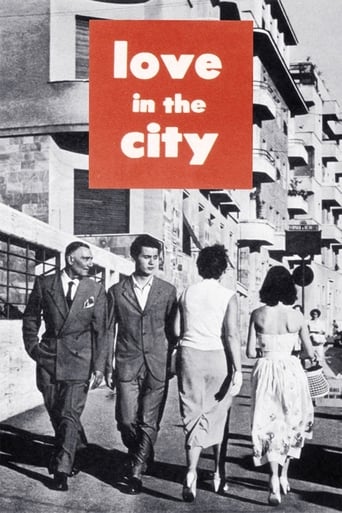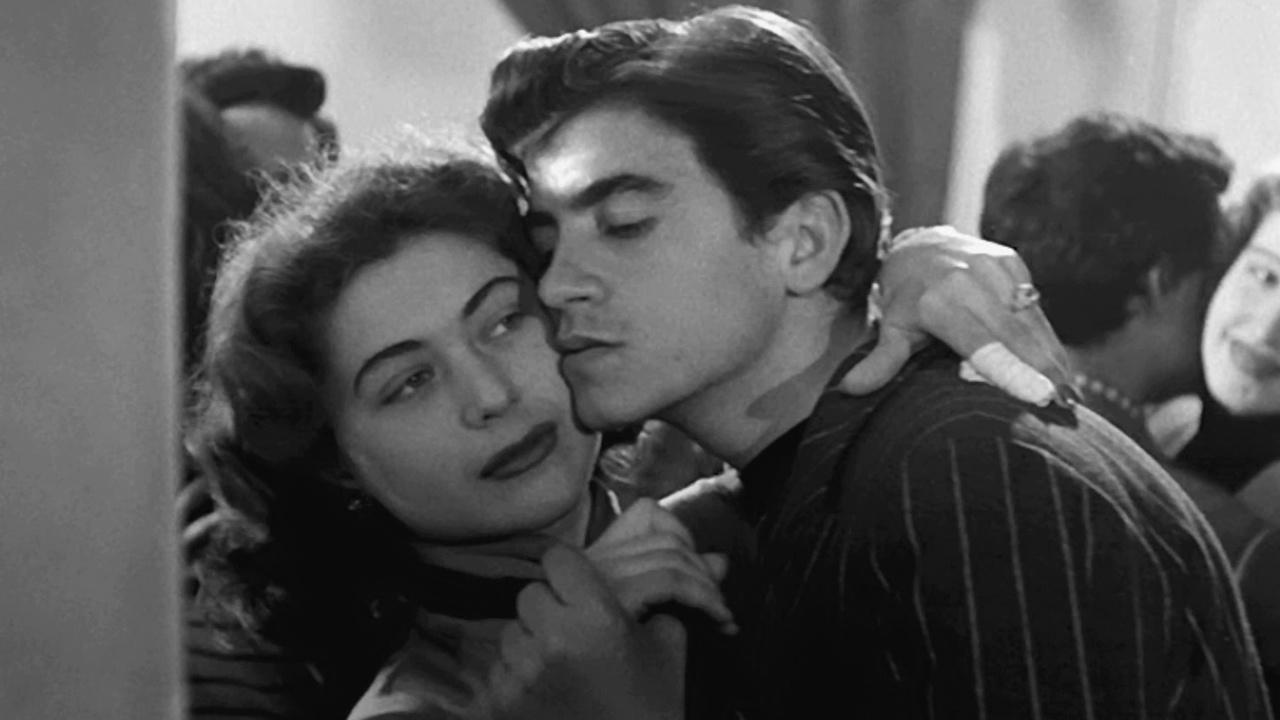sashank_kini-1
Love is the City is an anthology film of six segments badly assembled. There is a theme of love that underlies each segment in different and unique ways, but there is no pattern or connection that makes this 'love' representative of love in Italy. Without a unifying structure, we feel like poor Daffy Duck from Duck Amuck, constantly subjected to the film's inexplicably changing tones. We give up ultimately, disappointed and spurned.This movie could've left its happier, lighter moments for the first half, and the bleak, poignant moments for the second. Or vice versa. Its abandonment of an overall rhythm makes it damningly ineffectual. One of the film's directors (and these are major Italian directors whose best films have been regarded among the finest in world cinema) apprises us seconds before first the segment begins, that 'we should not be expecting the genric Hollywood style of representation. This movie shall not rouse our passion like a Marilyn Monroe flick'. I'd rather have switched my DVD to Monroe's Seven Year Itch and be bewitched with her beauty than watch this. Love in a city is sadly a passionless film, cold and colorless as a whole; it's a modified version of the proverb 'Too many cooks spoil the broth' – here, the six cooks or rather Masterchefs together create no broth!Instead, each one throws in his flavors, ignoring what the others are making. After the dishes are made, there is a chaos in the kitchen because everybody has created something highly dissimilar from the others: now how shall they serve this to the hungry guests? One of the six 'Masterchefs', probably Carlo Lizzani, nervously shows up and tells the guests just how 'different' this experience shall be, because the ingredients include non-actors who give first-hand account of their experience. He fingerpoints rival Hollywood offerings, blaming them for being simple, straight and unmemorable. The guests looks on wide-eyed, anticipating something challenging and unique.Dish number one enters. It's called 'Paid Love', and Carlo Lizzani has prepared it. The name itself suggests that its got something to do with prostitutes. There's a narrator here who takes his camera to desolate streets at night to film streetwalkers. Many prostitutes play themselves as if they are being interviewed extempore. Vallie is questioned about shoes, Tilde says she takes ten cups of coffee everyday, another talks about being abandoned at a young age. Anna, a harlot with a manly appearance, if filmed at home where we learn 'she'll read Mickey Mouse before she goes to bed'. All the subjects occupy the centre of the frame. The bleakness of their existence is captured well. Would've been ironic had the interviewer himself used the services of the prostitute at the end, but that's not what this film intends to show. It remains like a documentary for the fifteen or so minutes it stays on screen.The next dish is brought out. There is a flurry of excitement among the guests when the name Michelangelo Antonioni is heard. Slowly they see a couple of faces usher in and stand in front of a huge wall. Another narrator introduces them as 'people who had attempted suicide and were here to share their experience'. Raw stories of unfulfilled love, of deceit are shared by the people, one after the other as they relive their haunting experience. Many unsettling images come up, like when one woman speaks of the moment when she had fainted after plunging into the river, and as she speaks the image of the flowing water is captured as though it's her that's floating. It's an eerie piece all in all.Dish three is a peppy one by Dinio Risi with waltzing, dancing, swinging, flirting and wall-flowering guys and gals. That's more than an adequate description for the piece. Dish four soon makes guests quiver with mad excitement as the name 'Fellini' is pronounced. This part includes a third-person view of the narrator, a journalist who investigates marriage agencies to learn what people are willing to do to get married. Led by sprightly little boys and girls to Mrs. Cibele's office, our journalist, after a small talk with her husband, tells Mrs.Cibele about a 'friend who suffers from a werewolf syndrome and can only be cured if he gets married'. To the journalist's surprise (there's no such friend, obviously), Mrs. Cibele agrees to find a girl for his friend and gets him one without any difficulty. Later it's found that the girl is highly impoverished and is desperate to marry anyone who can take good care of her.Dish five, the most elaborate one (not in terms of content but rather in terms of duration) deals with an impoverished hapless mother's love for her child which reunites the two ultimately, inspite of her attempts to abandon him. A haunting score is heard often, as if angels from the heaven above are lamenting this woman's misery and pathos. But there's little for us to care for this woman or this child to even bother sympathising with them. Dish six is sexyy, perky and quirky, capturing pretty, glowy busty women from far and up-close, and the never-ceasing dirty male gaze.Each dish has moments but it is when the six (or seven) 'Masterchefs' or directors – Lizzani, Antonioni, Risi, Fellini, duo Zavattini and Masseni and Lattuada – announce 'That's a wrap! Thank you for coming to the show', that the guests (we, obviously) begin wondering "What exactly have you given us?" The sum effect of the six segments is zilch, and that's what makes Love in The City a devoid-of-director's-passion fruitless watch.
cpwillett
While this was not the best work by any of the directors, it's still fascinating. Something not mentioned in the other reviews is that the film uses a framing device of a magazine--this is issue #1 of a cinema journal, with each short film introduced like an article, with a byline. It reminded me of Vertov's Kino-pravda series in that respect. All of the stories are supposedly real-life, but some seem more real than others. In classic neorealistic style, all of the actors are non- professional, but it goes beyond that. Zavattini's segment, which has the strongest narrative, shows newspaper headlines suggesting it's entirely true; Antonioni's seems staged until one of the characters shows a scar that looks very real. Fellini's is the least documentarian segment, but still affecting.
TheLittleSongbird
I saw L'Amore in Citta as part of my Fellini quest. And I have to say that I found the film very interesting. Separated into five segments by five different directors, it is charming, sometimes heart breaking and I was always intrigued. All the segments are filmed absolutely beautifully especially Fellini's and Lattuada's. The music is always great, ranging from nostalgic(Rissi), bright(Fellini, though nostalgic comes under him also) and poetic(Lattuada). Of the segments my personal favourite is Lattuada's, especially for the beautiful scoring and the poetic ending. Rissi's is also very charming, very simple story but beautiful everywhere else. My least favourite, though still good, is Zavattini's, I love the climax which is very touching, as is the scene with the mother on the edge of the fountain, but found the very ending jarring compared with the scene before it and the rest of the neorealistic feel of the segment. Antonioni's documentary-like approach is interesting and the interviews are fascinating, not just the subject matter but also what there is to say. I saw L'Amore in Citta for Fellini, and apart from an ending that I think could have had more to it he doesn't disappoint. The beautiful visuals, deliberate pacing, nostalgic yet mystical story telling and colourful music are all there, and Fellini's poetic and quite ambitious style is as distinctive as you would expect. All in all, a very well done film. 8/10 Bethany Cox
mifunesamurai
Antonioni goes deep and examines suicide caused by heartbreak. Fellini verges on his strange world. Risi lampoons the dance halls. Zavattini goes neo-realism with the love of a mother to her child. Lattuada deals with lust and perversion with bouncing breasts, swinging hips and eyes popping out of their sockets. Fellini is the most interesting one.


 AD
AD



